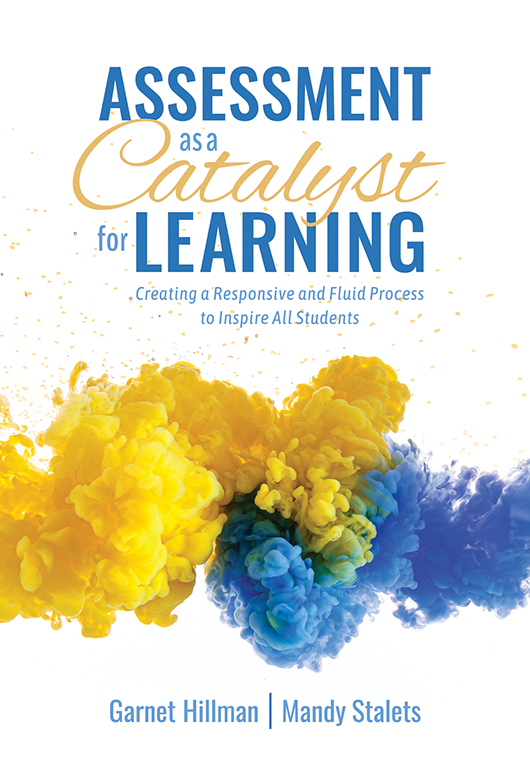Free Reproducibles
Assessment as a Catalyst for Learning
Creating a Responsive and Fluid Process to Inspire All Students
With the right mindset, the assessment process can be a gift to our students that propels meaningful learning for all. Discover how to embrace formative and summative assessment practices to identify and unwrap priority standards, develop learning progressions, and plan daily instruction that supports student growth and inspires learning.
Benefits
- Understand how to use formal and informal formative assessment as well as summative assessment to empower students and increase learning for all.
- Analyze ways to plan backward and design mindful assessment and instruction.
- Receive practical steps for application for developing learning progressions, summative assessments, and formative assessments.
- Discover how to collaborate around assessment with professional learning community (PLC) concepts.
- Answer end-of-chapter reflection questions to deepen your understanding of key concepts.
TABLE OF CONTENTS
Chapter 1: Assessment Defined
Chapter 2: Learning Progressions
Chapter 3: Summative Assessment
Chapter 4: Informal Formative Assessment
Chapter 5: Formal Formative Assessment
Chapter 6: Daily Instruction—Assessment Comes Full Circle
REPRODUCIBLES
Chapter 1
Chapter 2
- Figure 2.2: Break Down a Standard Into Learning Targets With an Unpacking Protocol
- Figure 2.6: Learning Target Self-Assessment Template 1
- Figure 2.7: Learning Target Self-Assessment Template 2
- Next Steps for Prioritizing Standards and Developing Learning Progressions
Chapter 3
- Figure 3.1: Assessment Plan for a Standard—Summative Assessment and Formative Assessment Alignment to Targets
- Figure 3.2: Planning Tool for Summative Assessment
- Figure 3.4: Teacher Reflection Questions for a Summative Assessment
- Figure 3.5: Error-Analysis Tool
- Figure 3.6: Single-Point Rubric
- Figure 3.7: Student Reflection Questions for a Summative Assessment
- Next Steps for Determining Summative Assessments
Chapter 4
- Figure 4.1: Student Observation Template
- Figure 4.2: Student Feedback Reflection
- Figure 4.3: Misconception and Intervention Template
- Next Steps for Determining Informal Formative Assessments
Chapter 5
- Figure 5.1: Socratic Seminar Template
- Figure 5.2: Student Group Work Observation Template
- Figure 5.3: Planning Tool for Formal Formative Assessment
- Figure 5.4: Assessment Alignment Template
- Figure 5.5: Data Notebook Summary Tool
- Figure 5.6: Sample Learning Progression Assessment Alignment
- Next Steps for Determining Formal Formative Assessments
Chapter 6
- Figure 6.2: Collaborative Group Planning Template
- Figure 6.4: Student Self-Assessment Check-In Template
- Figure 6.5: Aligned Resources Planning Template
- Next Steps for Planning Daily Instruction
SUGGESTED RESOURCES
BOOKS
- Dimich, N. (2015). Design in five: Essential phases to create engaging assessment practice. Bloomington, IN: Solution Tree Press.
- DuFour, R., & DuFour, R. (2012). The school leader’s guide to Professional Learning Communities at Work. Bloomington, IN: Solution Tree Press.
- DuFour, R., DuFour, R., Eaker, R., Many, T. W., & Mattos, M. (2016). Learning by doing: A handbook for Professional Learning Communities at Work (3rd ed.). Bloomington, IN: Solution Tree Press.
- Erkens, C. (2016). Collaborative common assessments: Teamwork. Instruction. Results. Bloomington, IN: Solution Tree Press.
- Erkens, C. (2019). The handbook for collaborative common assessments: Tools for design, delivery, and data analysis. Bloomington, IN: Solution Tree Press.
- Erkens, C., Schimmer, T., & Dimich, N. (2017). Essential assessment: Six tenets for bringing hope, efficacy, and achievement to the classroom. Bloomington, IN: Solution Tree Press.
- Erkens, C., Schimmer, T., & Dimich, N. (2018). Instructional agility: Responding to assessment with real-time decisions. Bloomington, IN: Solution Tree Press.
- Ferriter, W. M. (2020). The big book of tools for collaborative teams in a PLC at Work. Bloomington, IN: Solution Tree Press.
- Hillman, G., & Stalets, M. (2019). Coaching your classroom: How to deliver actionable feedback to students. Bloomington, IN: Solution Tree Press.
- Marzano, R. J. (2017). The new art and science of teaching. Bloomington, IN: Solution Tree Press.
- Mattos, M., DuFour, R., DuFour, R., Eaker, R., & Many, T. W. (2016). Concise answers to frequently asked questions about Professional Learning Communities at Work. Bloomington, IN: Solution Tree Press.
- Schimmer, T., Hillman, G., & Stalets, M. (2018). Standards-based learning in action: Moving from theory to practice. Bloomington, IN: Solution Tree Press.
- White, K. (2017). Softening the edges: Assessment practices that honor K–12 teachers and learners. Bloomington, IN: Solution Tree Press.
- Wiliam, D. (2018). Embedded formative assessment (2nd ed.). Bloomington, IN: Solution Tree Press.
WEBSITE

